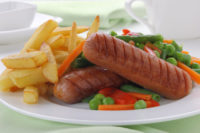News: Red Meat Raises Cancer Risk 25%
One in 10cases of both lung and bowel cancer could be prevented if people cut down on beef, lamb, pork, sausages, ham and bacon, scientists say.
Red meat also increases the risk of cancers of the liver and oesophagus, the study found.
The research, involving nearly 500,000 people, adds to growing evidence that too much meat in the diet can be deadly.
Health experts are increasingly concerned at the role of diet -- particularly meat -- in cancers. Last month, a report from the World Cancer Research Fund warned that red meat was a major contributor to the disease.
Its scientists urged people to stop eating processed bacon, ham and sausages and consume no more than the equivalent of three 6oz steaks a week.
The latest findings, published today in the science journal PLoS Medicine, reach a similar conclusion. Researchers at the U.S. National Cancer Institute looked at the records of 494,000 people aged 50 to 71 taking part in an extensive diet and health study.
Volunteers filled in detailed questionnaires about their dietary habits over the previous year. That allowed the scientists to work out what proportion of their calories came from red and processed meat.
The researchers then looked at the medical histories of the 20% of volunteers eating the most meat, with the 20% eating the least.
The biggest red meat eaters were 25% more likely to be diagnosed with bowel cancer during the eight-year study, and 20% more likely to develop lung cancer. For processed meat, the increased risk was 20% and 16% respectively.
In Britain, the risk of contracting lung cancer during a lifetime are one in 13 for men and one in 23 for women. One man in 18 and one woman in 20 will suffer bowel cancer.
The American study also linked red meat to liver and oesophagal cancer, but other cancers appeared to be "largely unaffected" by meat in the diet, according to the author, Dr Amanda Cross. Red meat even appeared to reduce the risks of cancer of the womb lining. The study took into account factors like smoking, which is by far the biggest single cause of lung cancer.
However, the scientists say other lifestyle factors such as income or obesity could have had an influence.
They are also unable to say exactly which type of meat causes which type of cancer.
Cooked red meat contains several substances -- such as PAHs, or polycyclic aromatic hydrocarbons -- which can damage DNA, and trigger cancers. Saturated fat and iron in red meat is also linked to cancer.
Last month's World Cancer Research Fund report concluded that alcohol and obesity were the biggest causes of cancer.
But it also urged people to eat no processed meats like ham and bacon, and eat only 500g of cooked red meat a week.
From the December 17, 2007, Prepared Foods e-Flash
Looking for a reprint of this article?
From high-res PDFs to custom plaques, order your copy today!




